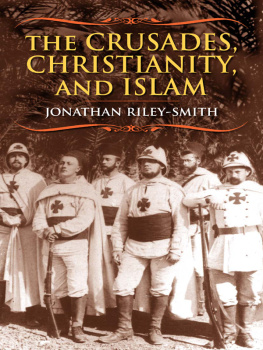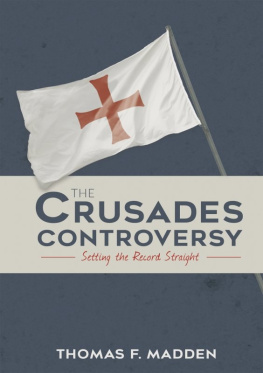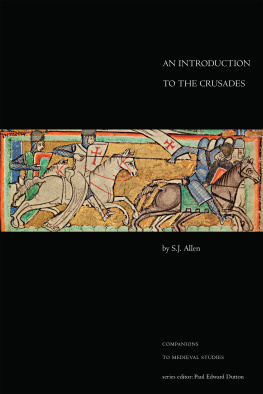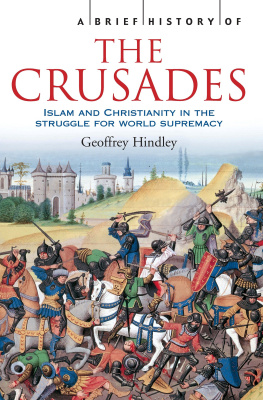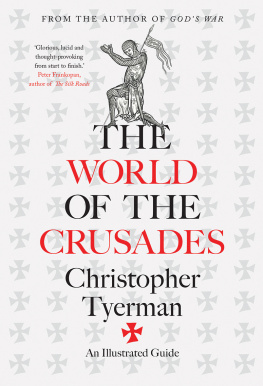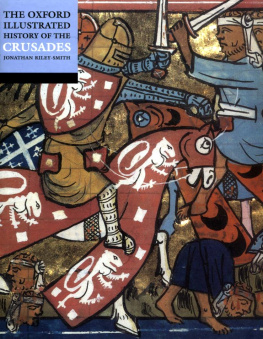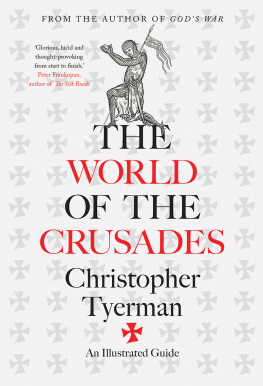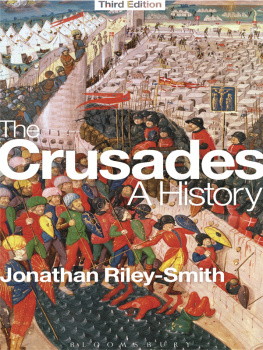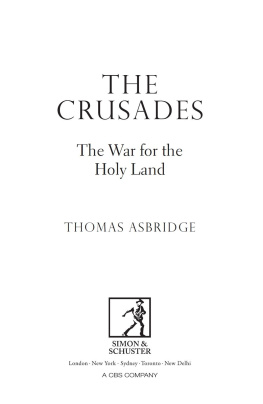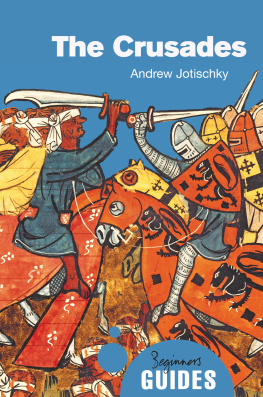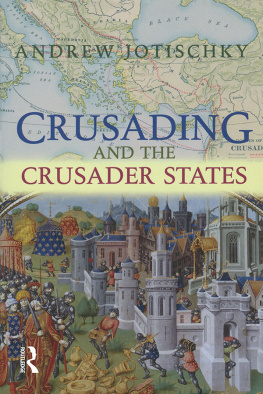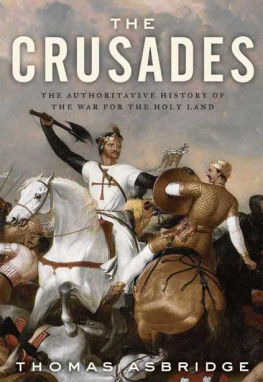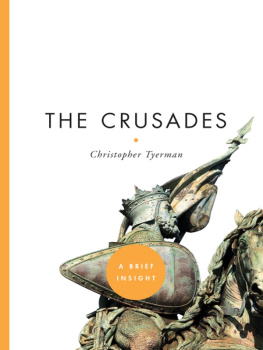THE CRUSADES, CHRISTIANITY, AND ISLAM
The Bampton Lectures in America
BAMPTON LECTURES IN AMERICA
The Prospects of Western Civilization, Arnold J. Toynbee 1940
New Discoveries in Medicine: Their Effect on the Public Health, Paul R. Hawley 1950
Gospel and Law: The Relation of Faith and Ethics in Early Christianity, Charles H. Dodd 1951
Art and Technics, Lewis Mumford 1952; reprinted with a new introduction by Casey Nelson Blake 2000
Modern Science and Modern Man, James B. Conant 1952
Challenges to Contemporary Medicine, Alan Gregg 1956
The Idea of Revelation in Recent Thought, John Baillie 1956
Four Steps Toward Modern Art: Giorgione, Caravaggio, Manet, Cezanne, Lionello Venturi 1956
Science in the Making, Joel Henry Hildebrand 1957
Prescription for Survival, Brock Chisholm 1957
The Importance of Being Human: Some Aspects of the Christian Doctrine of Man, Eric Lionel Mascall 1958
The Art of William Blake, Sir Anthony Frederick Blunt 1959
From Miasmas to Molecules, William Barry Wood 1961
Christianity and the Encounter of the World Religions, Paul Tillich 1963
A Natural Perspective: The Development of Shakespearean Comedy and Romance, Northrop Frye 1965
Man in the Universe, Fred Hoyle 1966
Mental Illness: Progress and Prospects, Robert H. Felix 1967
The Religious Significance of Atheism, Alasdair MacIntyre and Paul Ricoeur 1969
Victorian Architecture: Four Studies in Evaluation, Sir John Summerson 1970
Magic, Science, and Civilization, Jacob Bronowski 1975
Titian: His World and His Legacy, David Rosand, ed. 1982
Faith and Reason, Anthony Kenny 1983
Language and Information, Zellig Harris 1988
The Painters Practice: How Artists Lived and Worked in Traditional China, James Cahill 1994
THE CRUSADES, CHRISTIANITY, AND ISLAM
Jonathan Riley-Smith
COLUMBIA UNIVERSITY PRESS NEW YORK
COLUMBIA UNIVERSITY PRESS
Publishers Since 1893
cup.columbia.edu
NEW YORK CHICHESTER, WEST SUSSEX
Copyright 2008 Columbia University Press
Paperback edition, 2011
All rights reserved
E-ISBN 978-0-231-51794-2
Library of Congress Cataloging-in-Publication Data
Riley-Smith, Jonathan Simon Christopher, 1938
The crusades, Christianity, and Islam / Jonathan Riley-Smith.
p. cm.(Bampton lectures in America)
Includes bibliographical references and index.
ISBN 978-0-231-14624-1 (cloth : alk. paper)ISBN 978-0-231-14625-8 (pbk. : alk. paper)ISBN 978-0-231-51794-2 (electronic)
1. Crusades. 2. Christianity and other religions. 3. IslamRelationsChristianity.
I. Title. II. Series.
D157.R536 2008
909.07dc22 2008001201
References to Internet Web sites (URLs) were accurate at the time of writing. Neither the author nor Columbia University Press is responsible for URLs that may have expired or changed since the manuscript was prepared.
A Columbia University Press E-book.
CUP would be pleased to hear about your reading experience with this e-book at .
CONTENTS
The First Crusade was fought between 1096 and 1102. The crusading movement was at its most popular from the late twelfth century to the late fourteenth, but was still active in the fifteenth and sixteenth centuries. The last crusade league was the Holy League, which began the recovery of the Balkans from the Turks between 1684 and 1699. The last operative order-state of a military order was Hospitaller Malta, which succumbed to Napoleon in 1798. A new military order was founded as late as 1890, although it had a very short life, as we will see. We are faced by a movement that lasted for hundreds of years and touched the lives of the ancestors of everyone today of Western European descent and of many of Eastern European, Jewish, and Muslim descent as well. No one can feel comfortable about this aspect of our collective experience, but for intellectual as well as moral reasons the role of its historians is an awkward one. In the last thirty years their understanding of the movement has led them to reject the long-held belief that it was defined solely by its theaters of operation in the Levant and its hostility toward Islam The more they do so the more they find themselves contra mundum or, at least, contra mundum Christianum, because their conception of the realities of crusading turns out to be in conflict with those of nearly everyone else, from leading churchmen and scholars in other fields to the general public.
In many ways the Crusades deserve their poor reputation. Like all religious wars, they were marked by indiscipline and atrocities. As military expeditions that were also pilgrimages, they had to be open to all, sinners as well as saintsespecially sinnersand there was no system for screening volunteers to identify the unsuitable, who might include psychopaths. The popes, who authorized them, lost control once the armies were on the march, and the fact that the laymen who were entrusted with leadership in the field were volunteers made adequate chains of command hard to establish. The methods employed to encourage recruitment heightened emotions in men who could then be exposed to tension and alienation for very long periods of time. Although it is hard to draw lessons from modern combat psychiatry and apply them to situations hundreds of years ago, it is known that volunteers are more likely to commit atrocities than conscripts and that over-long exposure to stress is bad for efficiency and discipline.
Measures assuring greater cohesion and control began to be adopted in the thirteenth century. The crusaders bound for the Levant were being transported by sea, which reduced the number of noncombatants, since the poor could not afford a maritime passage, and forced the planners to think about logistics, which were less problematic now that the armies were not encumbered by hordes of the unsuitable. The decision of the papacy to raise large sums from the taxation of the church, which were then allotted to those leaders who were taking the cross, provided a means of subsidizing crusaders through their commanders and therefore of making them more amenable, A huge gulf separates the scratch forces of the twelfth century from the Christian navy, which fought the battle of Lepanto in 1571, or the armies of the Holy League, which were recovering Hungary in the 1680s.
There was obviously more to crusading in the central Middle Ages than cruelty and indiscipline, but nothing can eradicate from present-day minds the impression left by those unruly armies. Among the descendants of those who perceive themselves to have been damaged by them, the Muslims and the Greek Orthodox have developed mythistoriesto use a word adopted by Dr. Gary Dickson in another contextin which memories of genuine injuries have been embroidered, even re-created, long after the events concerned. The perception most modern Muslims have of the Crusades dates only from the end of the nineteenth century, as we shall see. It constituted, in fact, a transference onto the past of feelings of alienation engendered by imperialism. In the case of the Greeks it was the failure of the West to come to the assistance of the rump of the Byzantine empire in 1453two and a half centuries after the sack of Constantinople by the Fourth Crusadeand resentment building up during the long years of subjection to the Ottomans that seem to have fanned the bitterness, although it is true that the Greek church had suffered from its refusal to reconcile itself with Latin Christianity on papal terms.

